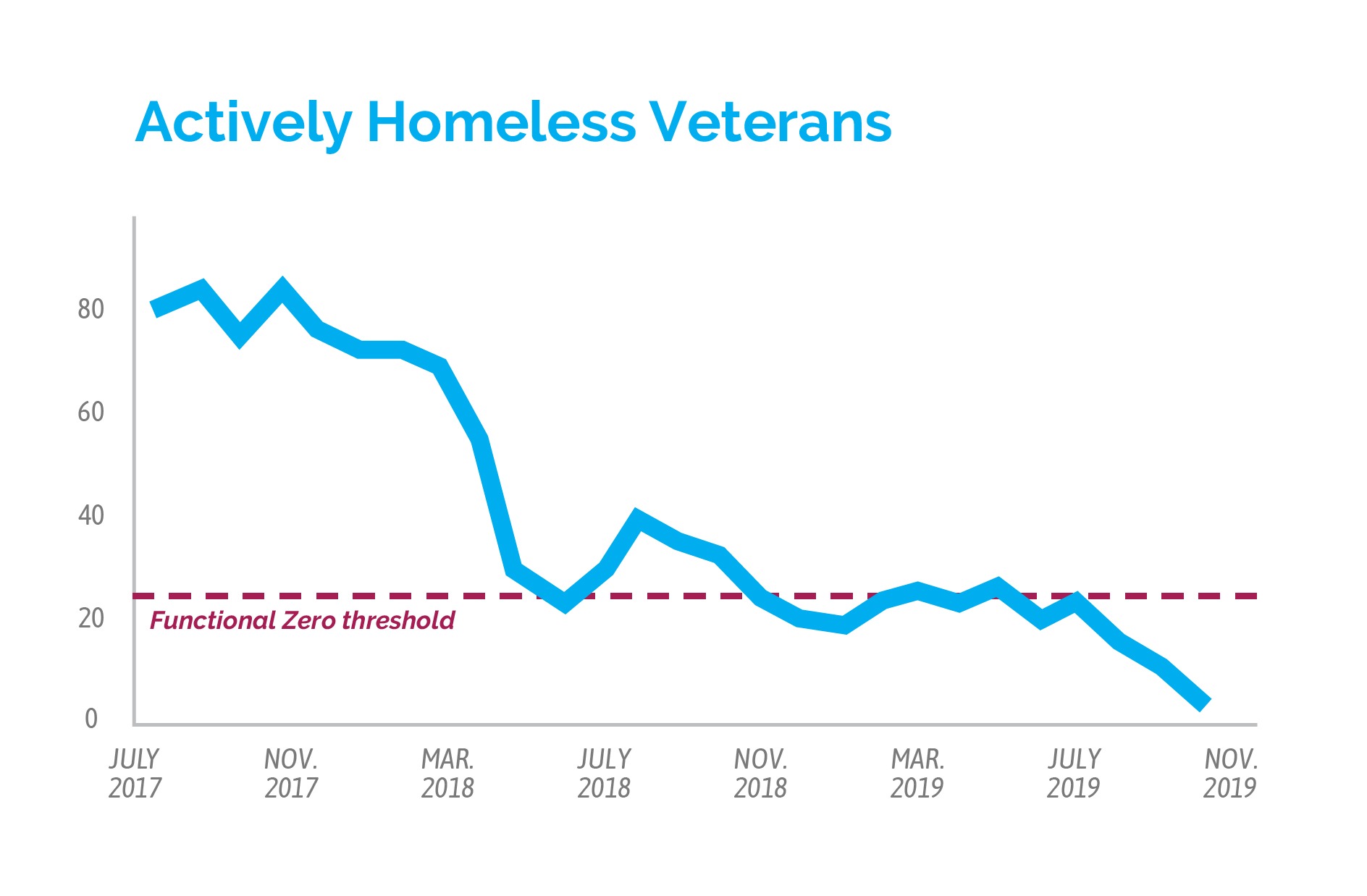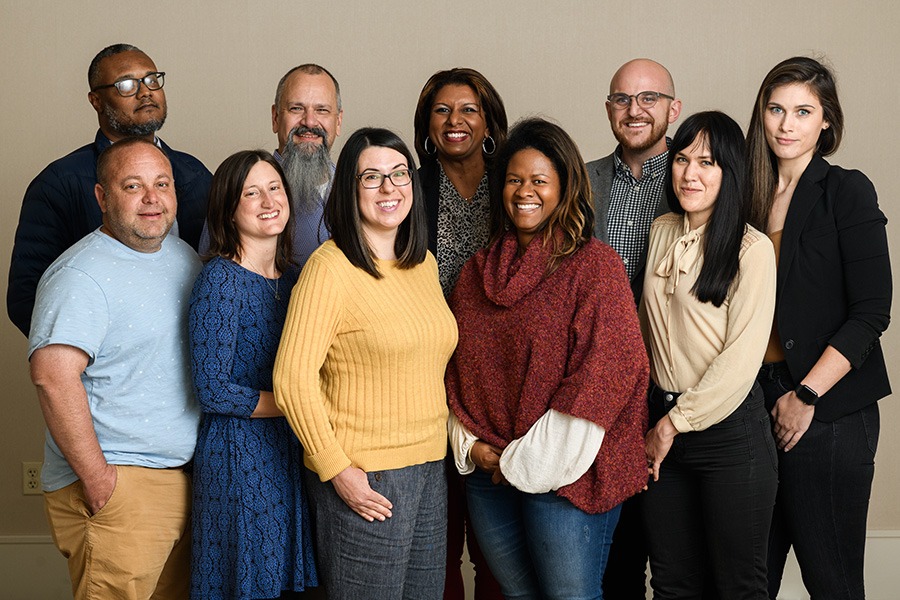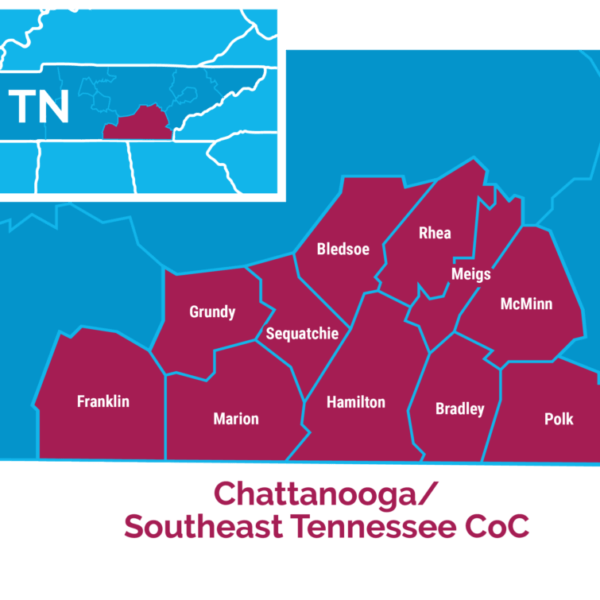(link to map)
Media Contact: Wendy Winters
Phone: 423-710-1501 ext. 1
Email: wwinters@homelesscoalition.org
- As part of Built for Zero, Chattanooga / Southeast Tennessee has joined an elite group of just 11 communities in the country that have reached functional zero on veteran homelessness, a milestone that means fewer veterans experience homelessness than can be routinely housed in a month.
- It has sustained this milestone for more than two months, proving its homeless response system can ensure veteran homelessness is rare and brief even as new veterans experience housing crises.
- The average length of time it takes a veteran to be housed went from 80 to just 48 days.
- The Chattanooga and Southeast Tennessee homeless response system serves a population of approximately 700,000 across 11 counties.
CHATTANOOGA, TN — The Southeast Tennessee Region, which includes Chattanooga, has become just the 11th community in the country to achieve functional zero for veteran homelessness, a dynamic measure for ending veteran homelessness that means fewer veterans are experiencing homelessness than can be housed in a month. This certification comes from Built for Zero, a movement of more than 80 cities and counties across the country working to measurably end homelessness led by the nonprofit Community Solutions.
Reaching functional zero for veteran homelessness is the achievement of 10 organizations, led by the Chattanooga Regional Homeless Coalition (CRHC), that came together to improve coordination across service providers and overcome barriers that were keeping veterans homeless.
“Today’s announcement celebrates a system that has made homelessness among veterans rare and brief when it occurs, and it has inspired confidence that we can maintain this reality for veterans in Chattanooga and across Southeastern Tennessee,” said Wendy Winters, Executive Director of the Chattanooga Regional Homeless Coalition. “By reaching functional zero, Chattanooga and Southeast Tennessee is able to use live data to prove it has built a homeless response system that can achieve functional zero and sustain it, even if new veterans experience housing crises over time.”
“Over the last 4 years, our community has come together to move 375 veterans into permanent housing, and counting,” said Emma Beers, Community Lead for the Southeast Tennessee region. “This achievement wouldn’t have been possible without the hard work of staff across agencies that remain tirelessly dedicated to keeping those who served our country off the streets.”
MEETING TWO STANDARDS FOR ENDING VETERAN HOMELESSNESS

This milestone builds on an achievement in 2017, when the City of Chattanooga met the federal criteria and benchmarks for ending veteran homelessness set by the United States Interagency Council on Homelessness (USICH), the federal body charged with implementing the federal strategic plan to prevent and end homelessness. While that milestone was important, it represented only the city of Chattanooga, rather than the entire Continuum of Care, which covers a population of nearly 700,000 people across Southeast Tennessee. That benchmark was also based on a snapshot of how the homeless response system was performing when it was certified.
Reaching functional zero for ending veteran homelessness does not mean that the region’s veterans are no longer facing challenges that may cause them to become homeless. Rather, it means that a coordinated system of care has been established that connects homeless veterans to housing and services, effectively ending their homeless status soon after they’ve been identified. The system of care has to be maintained and continually fine-tuned to remain effective.
“This achievement is proof that functional zero is within reach anywhere public, private and non-profit partners use data to deploy the right resources at the right times to the right Veterans,” said Secretary of Veterans Affairs (VA) Robert Wilkie. “Through ongoing collaboration, VA, the U.S. Department of Housing and Urban Development (HUD) and community-centric organizations such as the Chattanooga Regional Homeless Coalition have helped more homeless and at-risk veterans secure and remain in stable housing in recent years than at any other time in history. VA remains committed to building on this remarkable progress.”
“By reaching functional zero, the Chattanooga and Southeast Tennessee region has demonstrated that it is on the leading edge of the national movement to measurably end homelessness, said Beth Sandor, co-director of Built for Zero. “By harnessing the power of data, the community has created a new reality that ensures that veterans experiencing homelessness are known by name in real time and supported by a system designed to get to zero.”
BY THE NUMBERS: A REGIONAL HOMELESS RESPONSE SYSTEM BUILT FOR FUNCTIONAL ZERO
During the past year:
- a total of 88 veterans were housed and removed from the community’s by name list of homeless veterans
- the average length of time it takes a veteran to be housed went from 80 to just 48 days.

Back Row – From Left to Right: Tony Eubank (Rapid Resolution Specialist, SSVF/VBHCS), Mark Williams (Director of System Performance, Chattanooga Regional Homeless Coalition), Carla Mohammed-Lawson (Outreach Manager, SSVF/VBHCS), Sam Wolfe (Homeless Program Coordinator, City of Chattanooga), Emma Beers (Coordinated Entry System Manager, Chattanooga Regional Homeless Coalition)
Front Row – From Left to Right: Casey Tinker (Service Coordinator, City of Chattanooga), Whitney Riddell (Coordinated Entry Specialist, Healthcare for Homeless Veterans), Wendy Winters (Executive Director, Chattanooga Regional Homeless Coalition), Royal Sanchez (Employment Specialist, SSVF/VBHCS), Jamie Ascarate (Coordinated Entry Outreach Specialist, Chattanooga Regional Homeless Coalition)
The Chattanooga Regional Homeless Coalition views the region’s homeless response, which includes many community partners across 11 Southeast Tennessee counties, as a coordinated system of homeless assistance options as opposed to programs and funding that operate independently of each other. As a nonprofit organization and the lead agency of the region’s Continuum of Care (CoC), through the U.S. Dept. of Housing and Urban Development (HUD), we measure the performance of the region’s homeless response as a coordinated system and play an integral part in the system’s planning process. Through our coordinated assessment and referral system, we also work to ensure access to assistance is offered equitably to all people experiencing homelessness so that the most vulnerable of our citizens receive the help they need before it is too late. To learn more about us, visit homelesscoalition.org and find us on Facebook and Instagram. Media Contact: Wendy Winters (wwinters@homelesscoalition.org)
Built for Zero is a national initiative of 85 cities and counties that have committed to measurably ending homelessness, one population at a time. It is led by Community Solutions, a non profit that works to create a lasting end to homelessness that leaves no one behind. Using a data-driven methodology, these communities have changed how local homeless response systems work and the impact they can achieve. 12 communities have reached functional zero, and 44 communities have achieved a measurable reduction. Quicken Loans is the leading sponsor of Built for Zero. Learn more at www.builtforzero.org or follow us at @BuiltforZero. Media Contact: Anna Kim (askim@community.solutions)
Learn more
Case study: How Chattanooga Reached Functional Zero for Veterans
Chattanooga Becomes 12th Community To End Veteran or Chronic Homelessness in the U.S.



